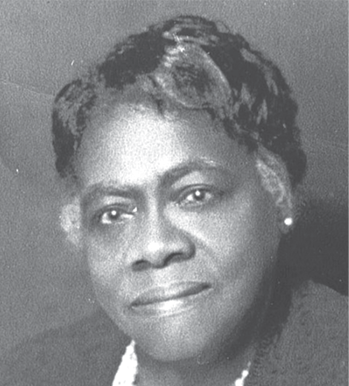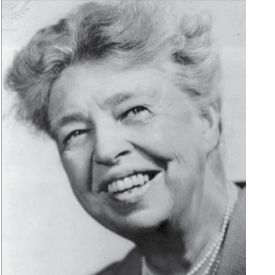
Mary McLeod Bethune 
Eleanor Roosevelt
As we approach the first Granby Racial Unity Festival on June 29, Granby Racial Reconciliation (GRR) will profile interracial relationships that are models of racial unity. For more information on the Racial Unity Festival, visit: https://www.granbyracialreconciliation.com/racialunity
One such groundbreaking relationship was that between civil rights leader and educator Mary McLeod Bethune (7/10/1875-5/18/1955) and political figure and humanitarian Eleanor Roosevelt (10/11/1884- 11/7/1962). For over a quarter century, these two influential women cultivated a friendship that was somewhat radical for the time—a mutually beneficial connection both personal and political. Roosevelt once said to Bethune, “I have come to admire and respect you–and to love you–for the spirit that goes into all of your work for all people.”
While Eleanor Roosevelt is relatively well-known, Mary McLeod Bethune is a rather obscure figure. This is surprising because Bethune was one of the nation’s most powerful Black political figures through the 1930s and ’40s. At a time when Black Americans had no role in federal policymaking, she was an advisor—both official and unofficial—to no fewer than five U.S. presidents.
Born in South Carolina in 1875 to formerly-enslaved parents, Mary McLeod was among the younger of 17 children. She was the first child in the family to learn to read and she earned a spot in a local school run by missionaries. Her parents had very few resources, but Mary showed promise and determination, and she won scholarships to continue her education. She attended seminary and missionary schools and came to clearly see the tremendous “lifting” power of education, particularly for Black girls and women.
Mary married fellow educator Albert Bethune in 1898 (separated in 1907) and they had one son. Bethune’s plan had been to work as a missionary in Africa, but there were no positions available for Black women. So, Bethune became an educator, teaching at several small Southern schools for Black students. In 1904, with just $1.50 in her possession, she founded the Daytona Educational and Industrial Training School for Negro Girls. In just two years, the Florida school grew from five students to 250. In 1923, Bethune’s school merged with the Cookman Institute for Men to become Bethune-Cookman College. Today it is the private Bethune-Cookman University in Daytona Beach.
Bethune gained influence through the 1920s, working on commissions under both President Coolidge (National Child Welfare Commission) and President Hoover (Commission of Home Building and Home Ownership). From 1924 to 1928, she was the president of the National Association of Colored Women’s Clubs (NACWC), with a motto of “Lifting as we Climb.” In 1935, she founded the National Council of Negro Women (NCNW), a national coalition of women’s organizations, and was president from 1935 to 1949. She was also an early member of the National Association for the Advancement of Colored People (NAACP).
Given her high-profile work, it was just a matter of time before Bethune crossed paths with Eleanor Roosevelt, who was increasingly involved in political activism. In contrast to Bethune’s story, Eleanor Roosevelt was born into a life of wealth and privilege, becoming First Lady when FDR won the presidency in 1933. Despite her privilege, Mrs. Roosevelt was an early and vocal advocate of the rights and needs of the poor and of minorities.
Bethune and Mrs. Roosevelt met for the first time in 1927, at the home of FDR’s mother Sara Roosevelt, at a meeting of the leaders of the nation’s most influential women’s groups. The story goes that the white women at this meeting were not willing to eat their meal beside the only Black guest in attendance, but the Roosevelt women made a point of making Bethune feel welcome. Here began a friendship with Eleanor Roosevelt that would have positive impacts on the country for years to come.
While speaking to the Commerce Department in 1934 about inequities in Black education, Eleanor Roosevelt said, “We must wipe out the feeling of intolerance whenever we find it…We must go ahead together, or we go down together.” Immediately after making this speech, she pointedly shook hands with Bethune and the other Black speakers in attendance. This was a significant moment, as there were still racial codes in place that made even formal contact between Whites and Blacks essentially forbidden.
This friendship led to Bethune’s unprecedented access to FDR throughout his presidency (1933-1945), and she became a trusted advisor regarding the specific challenges facing Black Americans. While FDR did not appoint Black leaders to top positions in his administration, he did appoint them to lower posts to show his support for political and economic equality. A group of about 100 Black scholars, intellectuals, and political leaders became the unofficial “Black Cabinet.” Their input, though never officially acknowledged, would significantly influence FDR’s New Deal policies. Bethune led this “Black Brain Trust,” which is said to have laid the groundwork for the modern civil rights movement.
Bethune was the first Black American to lead a federal agency when she was appointed the director of the Negro division of the National Youth Administration (NYA). Hundreds of thousands of Black Americans would find jobs, and Black colleges would gain funding, thanks to Bethune’s efforts. In 1945, Bethune accompanied President Harry Truman to a conference on the founding of the United Nations. As a representative of the NAACP, Bethune was the first Black woman to be included in such a high-profile meeting among world leaders.
First Lady Roosevelt was open and public regarding her warm friendship with Bethune. There was criticism from Whites who felt that lines were being crossed, but Roosevelt did not allow this to alter her behavior, always welcoming Bethune at the front entrance of the White House, walking with her arm in arm, and sitting beside her at meetings. Roosevelt even stayed at Bethune’s home from time to time, where she had her own guestroom. Historian Martha Jones called their relationship, “A conspicuous rejoinder to Jim Crow.”
Upon Bethune’s death in 1955, Roosevelt dedicated her syndicated column “My Day,” to this “really great American,” writing that she would “cherish the spirit that (Mary McLeod Bethune) lived by and try to promote the causes she believed in, in loving memory of a very wonderful life.”
Bethune was honored in 2022 with a statue in the U.S. Capitol’s National Statuary Hall Collection, where her likeness represents her home state of Florida. You can read more interracial stories by visiting RaceAmity.org.